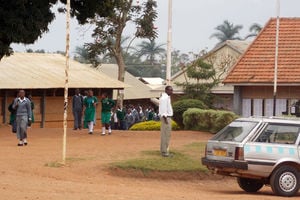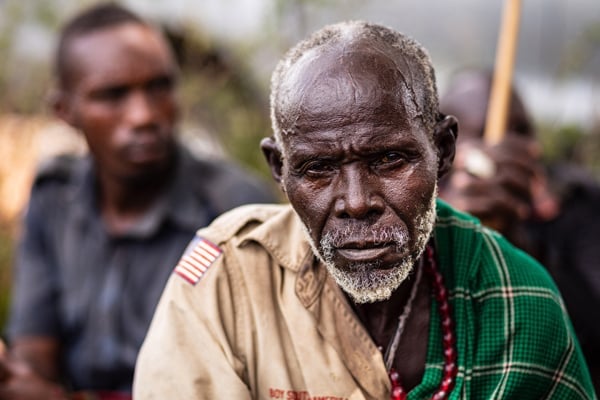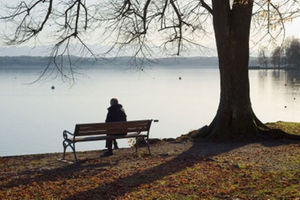
Hajj Hussein Ssengendo interracts with his wife Hajjat Nuliat Najjuko Ssengendo at their home in Masaka City’s suburb of Soweto in November 2024. Photo/Hanifah Nanyanzi
The lively atmosphere at Hajj Hussein Ssengendo’s home in Masaka City’s suburb of Soweto, is a reflection of a man who has lived his life to the fullest.
The home has all that an ageing senior citizen should have for life to move on.
“At this age of 99, I actually have nothing to do, but to eat, drink the best I need and rest a bit, that is what life is all about. I am not complaining, I have seen it all in life and have enjoyed it,” he said.
During his childhood, Hajj Ssengendo had dreams and aspirations. As an adult, he worked as a medical officer before he was appointed a magistrate.
He said: “I really loved serving as a medical personnel until the Almighty Allah chose me to serve as an army medical officer then as a lawyer until I was appointed a magistrate too."
Hajj Ssengendo honed his medical abilities at a time when Uganda was still under British Protectorate.
He was born on November 4, 1925 at Kako Village in present-day Masaka City.
Hajj Ssengendo was the first born in eight children to Hajj Hassan Musoke, who served as county chief of Kabula County and Ms Zuhura Musoke.
He studied at Kabula Primary School in Lyantonde District and Kabasanda Primary School in Butambala District before joining Mengo Secondary School, Kampala for his Ordinary Level education.
While at Mengo Secondary School, the young Ssengendo met Dr Tucker, a British national who inspired him to join the army medical training school at Kabete Hospital in Kenya due to his passion in the medical profession.
“I trained how to treat people and later I was employed at the same hospital given the experience I had obtained,” he narrated, adding that the army recruited him at the rank of lance corporal in its medical department.
From Kabete Hospital, Hajj Ssengendo said he joined Luweero Military Training Centre and later went to Sri Lanka Military School for further military training. “This is where I trained in the Bush warfare. Such training was relevant in order to prepare me to fight in the Second World War in the former Burma ( currently Myanmar),” he said.
However, Hajj Ssengendo said he didn’t fight in Burma because he was under 18 years when Japan invaded it in 1941. The British with assistance of Commonwealth troops began to reclaim Burma in January 1942, when Hajj Ssengendo was still under 18 years.
“I later went to Bombay in India and attained more military training,” he explained.
After that military training, Hajj Ssengendo said he returned to Nairobi and later to Uganda in 1954 with a confirmation letter that he had trained in the army.
“I was later recruited by the district commissioner who was in charge of Masaka then. I was earning shs900 but it was called silver money at the time,” he said.
Hajj Ssengendo added: “It was around this time that the British Government announced that those who trained in the medical profession through the army should be licenced to start selling drugs and treat patients.”
With his medical profession licence, Hajj Ssengendo said he ventured into selling drugs, which he used to purchase from Kampala, to locals in Mawokota County (present-day Mpigi District) where he was operating.
He later met Musa Kibiringe who was by then the Deputy Buganda Kingdom Katikkiro (premier) who introduced him to Mr Kawalya Kaggwa Balikoowa who was in charge of distributing various drugs to vendors.
Through Mr Balikoowa, Hajj Ssengendo said he got a job at Mulago Hospital in Kampala, but at the same time enrolled at the School of Hygiene in Mbale, which was being supported by Mulago Hospital.
“After my training at Mbale School of Hygiene, I was posted to work at Kabassanda Health Centre in Butambala County (present-day Butambala District) where I immunised many people.On average, I used to immunise 300 people a day,” he said.
After 10 years in the medical profession, Hajj Ssengendo went back to Kampala City and met his longtime friend Sheik Nsambu in 1962 who introduced him to Prince Badru Kakungulu, the then titular of the Muslim Community to serve as a judge after endorsement from Buganda Kingdom’s Kabaka Edward Muteesa II.
“When I met Prince Kakungulu , he looked at my medical documents and later appointed me as a native judge even though I had not done a law course. My appointment was confirmed by the then Kabaka of Buganda Muteesa II and I started receiving a salary of shs72 (silver money) and because of hard work, my salary was increased from shs72 to shs700,” he said.
As a native judge, Hajj Ssengendo started off by working at Mengo Court and was later transferred to Nsamizi Law School in Entebbe, which later was transformed into Law Development Centre in Kampala.
At Nsamizi Law School, he met Dr Brown, then principal of Nsamizi Law School and a British national, who appointed him to lead his fellow students.
“I was lucky to get a government sponsorship,which helped me finish my Law studies. I later graduated with a Diploma in Law and was posted to Mengo Court for legal practice,” Hajj Ssengendo narrated.
He added: “The first case I handled was of a Rwandese national who claimed to own cows inside Mengo Palace. This man explained that he even had a letter, which supported his claim of ownership of the cows, but those who arrested him said his intention [to enter the palace] was to kill the Kabaka of Buganda using a spear he had in his hand.”
Hajj Ssengendo did not convict the man. He argued that moving with a spear was not evidence enough to prove that the man was targeting the Kabaka.
However, other native judges were not impressed by his ruling and petitioned the Kabaka who instead applauded Hajj Ssengendo and branded him Musiraamu wange loosely translated as my Muslim friend.
“Another case I handled was about the election of Buganda Kingdom Katikkiro where Michael Kintu was among the contestants. One of the voters alleged that he [Kintu] had not done enough for Kabaka’s subjects,” he said.
The supporters of premier Kintu wanted Hajj Ssengendo to order the arrest of the voter who accused Katikkiro of incompetence. Hajj Ssengendo set the voter free arguing that Katikkiro Kintu had not filed the case in court and there was no reason for arresting the voter .
This ruling annoyed some people who reported him to Buganda Kingdom's Katikkiro. Buganda Kingdom eventually endorsed Hajj Ssengendo’s ruling. He was later transferred to Masaka High court as a judge.
“In Masaka, I handled numerous cases including one that involved the arrest of Democratic Party (DP) supporters led by Ben Kiwanuka who had refused to support Kabaka Yekka (KY). In my ruling, I ordered for the release of DP supporters citing that they had no case to answer because it was not a crime to support another political party. My judgment also become a subject of discussion at Mengo. But it did not affect my career. Instead, was I later appointed assistant Registrar at Mengo Court for my dedicated service,”Hajj Ssengendo said.
In 1965, he met the then Buganda Kingdom premier Joash Mayanja Nkangi who appointed him Busiro County chief assuming the title Sebwaana. Hajj Ssengendo started earning a salary of Shs1,800 per month.
“Here [in Busiro] I was given a lot of power including appointing soldiers who guard the clerk (kalaani) and other workers in Busiro County ,currently in Wakiso District.I was also in charge of collecting taxes from various parts of the county,”he said.
During the 1966 Buganda crisis when former President Milton Obote’s army attacked Mengo Palace (Lubiri),which subsequently led to the abolition of monarchies in Uganda, Hajj Ssengondo relinquished his roles in Buganda Kingdom and went into hiding in Mawokota County (Mpigi District ) .
“I later met the former Kampala City mayor Mr Walusimbi Mpanga who took me to work on his farm as a manager and had promised to pay me Shs 500 per month. But I did not take up the job since I had also received a call from Shaban Nkutu who was the then chairman of Uganda Peoples Congress and the Minister of works and Transport and he had promised me a job,”he said.
In 1969, Hajj Ssengendo was appointed a Grade II Magistrate to work in Kampala and was later transferred to Nakawa Court and Bugerere County as a Magistrate before returning to Masaka High Court to serve as Kalungu District magistrate.
Family life
He is married to Ms Shekati Nuliat Najjuko and they have 14 children. Hajj Ssengendo retired at the age of 60 from public service and was removed from the payroll though his fellow magistrates were not happy with it because of his vast experience in the Judiciary.
Hajj Ssengendo said in 1986, the then chief judge Justice Wakko Wambuzi took his issue to President Museveni and the latter directed that he continue working in the Judiciary, but on contract for two years. However, he served for four years and retired in 1990.
“I wanted to retire but people kept giving me different roles. For instance, in 1997 I was appointed chairman of the Parents Teachers association at Masaka Secondary School, a position I relinquished. But I have remained serving as the patron of the school to date,” he said.
The United Kingdom, Buganda Kingdom and the Ugandan government have since recognised Hajj Ssengendo for his distinguished service .







